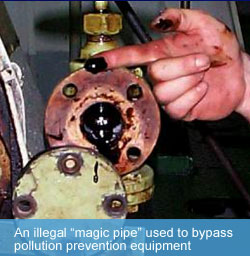“Magic Pipe” Costs Princess a Very Untidy $40M

A subsidiary of a U.S.-based international corporation has agreed to plead guilty to 7 felony charges at a cost of $40M, the largest-ever criminal penalty assessed involving deliberate vessel pollution.
Princess Cruise Lines managers have been cheatin’ and lyin’ about polluting the oceans with oil-contaminated shipboard waste, through a “magic pipe,” then directing subordinate employees to deconstruct it before inspections. Then intentionally lying about the cover-ups.
(VW corporate ethics is ocean-going too.)
 Beautiful XXXL ship as to naval architecture. $40M nasty as to corporate culture.
Beautiful XXXL ship as to naval architecture. $40M nasty as to corporate culture.
The Caribbean Princess, pictured here, was put into service in 2005. Its magic pipe spigot was opened to the oceans a year later for dumping contaminated waste.
 What’s a magic pipe? Wikipedia offers: “…a surreptitious change to a ship’s oily water separator, or other waste-handing equipment, which allows waste liquids to be discharged in contravention of maritime pollution regulations.”
What’s a magic pipe? Wikipedia offers: “…a surreptitious change to a ship’s oily water separator, or other waste-handing equipment, which allows waste liquids to be discharged in contravention of maritime pollution regulations.”
The particular incident of reported toxic release occurred in August of 2013, according to a U.S. Department of Justice news report. A newly hired engineer reported the illegal discharge to the British Maritime and Coastguard Agency which in turn alerted the U.S. Coast Guard. The whistle-blowing engineer then quit his job when the ship reached Southampton, England, for a port visit.
According to court documents, “the single illegal discharge dumped 4,227 gallons of oil-contaminated waste about 20 miles off the coast of [Southampton] England..,” as reported at the guardian.com.
As widely told, investigators showed that after the magic pipe was deconstructed, the chief engineer then held a “sham meeting” with crew in the engine control room pretending to look into the allegations, all while holding up a sign that read: “LA is listening.”
“…illegal practices were found on four other Princess ships, including use of clean ocean water to fool on-board sensors that would otherwise detect dumping of improperly contaminated bilge water,” reports theguardian.com. “Authorities say cost savings was the motive and that the ship’s officers and crew conspired to cover up what was going on.”
Apologizing for its employees who had violated relevant company policy and federal law, a company spokesman admitted deficient policies and procedures to prevent such illegal discharge schemes. I suggest that lies about cover-up attempts by company employees compounded the severity of the charges.
Cruise ships from 8 Carnival cruise line companies will be under a court-supervised Environmental Compliance Program for 5 years. Under this U. S. EPA program (potentially headed for the chopping block?), independent audits will be performed by an outside entity and a court-appointed monitor.
Further damages levied against parent Carnival Corp. include:
- $10 million of the $40 million criminal penalty will be devoted to community service projects to benefit the maritime environment;
- $3 million of the community service payments will go to environmental projects in South Florida; and,
- $1 million will be earmarked for projects to benefit the marine environment in U.K. waters.
·
 “What happens to individuals and societies when their most fundamental cultural, historical, and ecological bonds weaken—or snap?” asks an amazon.com reviewer of the book Coming of Age at the End of Nature: A Generation Faces Living on a Changed Planet. (Did you note the cap-doffing to environmentalist Bill McKibben in the book title?)
“What happens to individuals and societies when their most fundamental cultural, historical, and ecological bonds weaken—or snap?” asks an amazon.com reviewer of the book Coming of Age at the End of Nature: A Generation Faces Living on a Changed Planet. (Did you note the cap-doffing to environmentalist Bill McKibben in the book title?)
One of the book’s essayists, millennial James Orbesen, wrote:
“What I think my childhood exposure to environmental awareness did was convince me the adults were on the job.”
Interviewed by WYPR-FM’s Sheilah Kast, program host of “On the Record” (podcast here), the editor who chose Orbesen’s essay says she was attracted to what he went on to say in the piece; that he felt:
“…bamboozled by the idea that the older generation was somehow going to fix the problem.”
(hmm…)
P.S. In the same interview, Orbesen said he’s now weighing in on the problem.